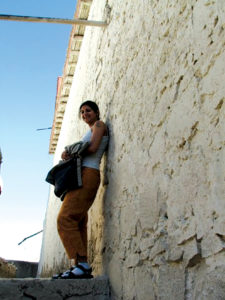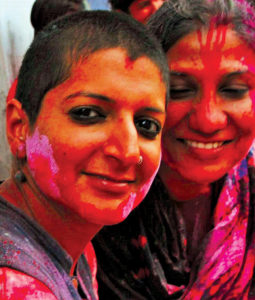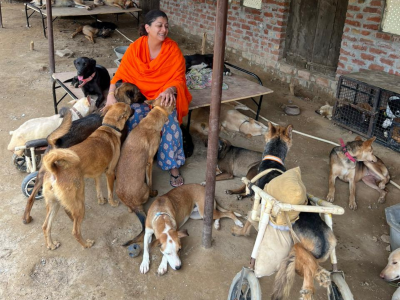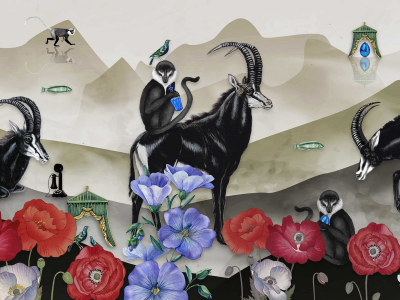Deepa lives a frugal life and helps people barter instead of buy. Her life is her message
Very early in Deepa’s life, her parents came to the conclusion that their daughter is “strange” to put it mildly. She doesn’t exist in the normative shell, instead breaks it all the time to assert how unsustainable human life on this planet has become. She is one of those very rare persons, though a shade too assertive for the comfort of many, who lives what she preaches. And she has many strong messages.
Deepa is leading an exceptional life, her philosophy is to travel light in the journey called life leaving no carbon footprints. A lean and thin woman, 38 years of age, she is single and ready to mingle, open to new experience. She can shave her head and travel alone for months in various parts of the world like a vagabond on a shoestring budget.

All her possessions are reduced to two small bags that weigh together not more than 8 kg. She is a ‘slow travel consultant’ —accompanied by her clients, she helps them slow down their travels. She never reads up about the places she travels to, likes to discover them without the baggage of expectations that comes with too much knowledge. Therefore, more often than not, she experiences the life of a place like very few.
She lives and helps others live life in the present moment, and not be bothered about things planned, or the checklist of things to do, for the best things in life come unannounced at the most unexpected places. She helps her clients get out of the mindframe ‘MMS or might miss something’. The idea is not to crave for things to happen but just be perceptive enough to know when it happens. She only provides her expertise to clients if they are willing to travel at least a month, perhaps, that’s why there are a few takers.
Recently she was in Iran for a couple of months. She says she ‘fell in love with the beautiful people’, realising to her delight that language is not a barrier. She felt she knew Persian: many words are common and she was quick to learn some more. Iranians are welcoming people and she traveled to remote places hitchhiking. They’d not only give her a ride but also feed her, provide her a safe shelter. There were instances when she took a lift to go to a particular place but the car — full of people, father, mother, grandparents, cousins, children — was heading in a different direction. They’d invariably persuade her to come with them. She even traveled to Balochistan, the south-eastern part of Iran bordering Pakistan. “They speak Urdu. I could understand every word,” she remembers.

Communication is never a problem with her for she keeps her heart open and believes in the essential goodness of people. Three years ago, she traveled for four months to South East Asia and ended spending just Rs 1,70,000. Last year, she did an 18-days cycle trip in Orissa and now is seriously contemplating a long trip to Cuba. The long list of her frugal travel adventures is only going to expand in the years to come.
When she’s in Delhi she leads a host of projects by example. She’s a permaculturist — in other words a system of cultivation intended to maintain permanent agriculture or horticulture by relying on renewable resources and a self-sustaining ecosystem — motivating people to grow edibles at home. She has a terrace garden which is open the whole day for people to visit and get inspired. She also conducts ‘shopaholic detox’ and dares people to try “buying nothing challenge for a year”. Many economists would argue against it, especially when the economy is experiencing sluggishness of demand for goods and services, but environmentalists would welcome it. Based on the premise that there’s always someone in need of something lying unused with someone else, she advocates buying pre-used — calling them “pre-loved” — goods.
Deepa is seated in her room on the first floor of a big, beautiful house that her parents built in the 1980s but is now in a state of disrepair. The walls of her room have not been painted for years, she sleeps on the floor on a cotton mattress that’s no thicker than a blanket. A rocking chair, a wall-mounted table, a floor cushion, and a rug is all she has in her room. “I haven’t slept in a bed for 20 years,” she declares. All of the items in her room has been gifted to her by friends as she ‘barters’ her way through life. She likes to serve people in return for support which could be cash, objects or an evening out.
Deepa hasn’t purchased clothes for many years, dresses exactly the same way whether she’s attending a party, a marriage or a funeral. On average, she spends Rs 3,000 a month, mostly on transportation. This means she can afford to be unemployed.
Deepa is perhaps the only resident of Delhi who uses a dry toilet. She defecates sitting on a wooden chair with a hole that opens into a plastic bucket. She covers excrement with sawdust and collects her poop for two weeks in the bucket before she transfers it to a big cylindrical container placed in a corner of the terrace and let it compost for a year before she uses it as manure in her garden. Covering excrement with sawdust insulates the environment with the foul smell. “Nothing really is a waste if it’s put to the right place,” is the point she wants to make.
She studied in Cambridge School nearby, purposefully getting just enough marks to pass. She considers her work for the corporate sector for seven years as a waste of time. She still takes up odd jobs and projects given her ‘skill sets’ to fund her travels. “I’m born to grow food,” she says and adds, “in the next birth will learn to cook food.” It’s no coincidence that many of her good friends are marvelous cooks. Her space, kitchen, room, bathroom, despite all the experimentation, is spic and span, fairly organised. She advocates writing letters as an emotional healing tool and remove clutter from your surroundings to declutter your mind. She also offers services to clean people’s wardrobe and help them get rid of things they don’t use.
And if you ask her about her philosophy of life, she starts throwing jargon at you: ‘extinction rebellion’ ‘unjobbing’ ‘unlearning’ ‘up learning’ ‘climate burnout’. Her ‘strangeness’ is a dramatic new way of sustainable living. She’s liberated from the consumerist madness of our times.





